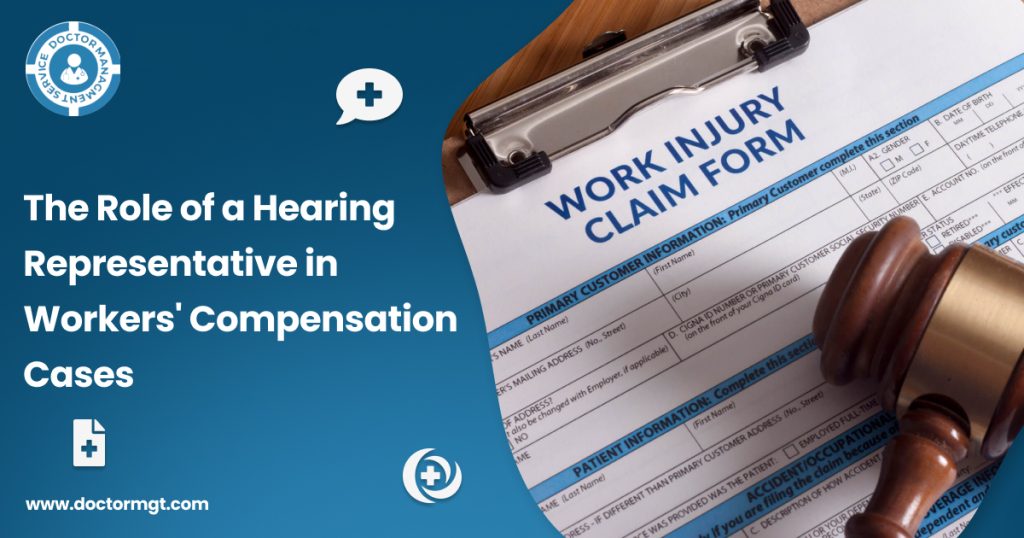The complexities and challenges of California’s workers’ compensation laws are not unfamiliar to doctors who have encountered issues in their workers’ comp claims. You feel as though the field remains discouragingly overwhelming, from basic steps such as ensuring payment for services rendered to worrying about your complicated bills.
It is at this point that a hearing representative can play a critical role. Now let’s focus on what they do and why this is so important for medical practices.
What is a Hearing Representative?
A hearing representative is your mouthpiece in the workers’ compensation scenario, who appears at your behest in proceedings before the Workers’ Compensation Appeals Board (WCAB) or similar tribunals.
Furthermore, they must make sure that they handle your side of the case effectively, which consequently involves several factors like documentation and presentation strategies.
What Does a Hearing Representative Do?
The hearing representative helps in:
Getting Everything Ready
For any hearing, a hearing representative will go over all your documents in detail first. They’ll review medical records, billing statements, and any previous decisions related to the case.
For providers, this means they will ensure that every detail concerning your services and billing is correct; it adheres to the laws of California. They are, in effect, priming the pump to arrange your side of the story in the best light.
Speaking Up for You
In the hearing, your representative is the active participant, the one speaking on your behalf. They will defend your case, advocate for you, and deal with questions that may be asked.
Moreover, they possess knowledge of the federal and state laws of workers’ compensation, thus ensuring they present your side of the story appropriately, which is quite critical, especially when there are billing or lien concerns.
Handling Documentation
The biggest of all the tasks that your representative is responsible for is managing and filing evidence. This involves gathering patient’s medical records, billing statements, and any other documents that support your case.
For doctors, it helps to make sure that your bills and services are documented correctly when handling billing problems such as billing errors or worker’s compensation lien collections.
Navigating Communication
Your representative serves as an intermediary in the financial relations between providers, insurance companies, and legal entities. They coordinate all the communication and negotiations which are always very helpful especially when dealing with claims over some billing issues. They endeavor to ensure that all parties are in parity and to safeguard your best interests.
Post-Hearing Steps
Your representative often has the responsibility of evaluating the decision after the hearing and advising on the subsequent steps. This would entitle it to file appeals or respond to any other requests that might arise in the process of finalizing the documents.
Additionally, they ensure they attend to all matters that require their attention after the hearing, and this assists in addressing any other related concerns you may have had regarding your claim.
Why You Need a Hearing Representative
Generally, for doctors dealing with workers’ compensation can be more than a little stressful experience. A hearing representative can be a game-changer in several ways:
1. Expert Knowledge
They are professionals in California’s workers’ compensation laws, they know how the system works. This expertise means your case is handled based on the legal requirements of the state, a move that may dramatically change the outcome.
2. Managing Complex Cases
Workers’ compensation cases might not be very easy. These potential complications are managed by a hearing representative, which relieves the burden from your practice. They do the paperwork, ensure the timely completion of various tasks, and make certain that all procedures run smoothly.
3. Better Reimbursement Outcomes
Having a representative on your side means that you are likely going to find better ways of performing some of the reimbursements. They help in correcting the billing issues and making payments reasonable to what the laws of California recommend so you are compensated well for the services you give to your patients.
In Summary
Anyone dealing with workers’ compensation cases in California needs to understand what exactly a hearing representative does and how they can help. They represent you in your case by working on your behalf throughout the preparation of your case, the hearing, and even after the hearing.
Hiring a hearing representative to handle your case can make it easier to go through the workers’ compensation claims process to make sure that you get fair compensation for services rendered.
If you have ever felt overwhelmed dealing with workers compensation billing and lien collections, then perhaps it is time to hire a hearing representative. Their role can go a long way in helping to reduce the complexities and increase your chances of getting the rightful compensation.

